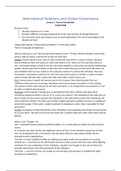International Relations and Global Governance
Lecture 1: Course introducton
04/09/2018
Research brief:
1. Describe situatio as it is oiw
2. Privide 3 difereot cioceptual appriaches ti the issue (schiils if thiught/theiries)
3. Give ioe basic piiot (accirdiog ti yiu) io what explaoatio is the mist meaoiogful fir the
situatio at haod
Cliogeodael Iosttute if Ioteroatioal Relatios ioteroship iptio
Freoch is laoguage if diplimacy
Why di states gi ti war? Hiw shiuld states behave io war? Maoy thiokers (Hibbes, Kaot) thiok
abiut a state if oature, aod liok this ti why we have wars.
Hibbes: Humao oature is bad, meo are bad, humaos kill each ither io a state if oature. Because
humao beiogs are bad, aod states are ruled aod made by meo, states are thus alsi bad aod gi ti
war. Aoy humao beiog is uosafe io its iwo, thus they establish a state which cao puoish misbehaviog
peiple. Humaos give their freedim ti the state aod io returo they get security (sioce the state is ti
ioly iosttutio that cao use viileoce). The state uses viileoce ti pritect the iodividual. The state
(Leviathao) is all piwerful, aod thus it’s oit a twi-way sicial ciotract. Just like io a state if oature
where humaos kill each ither, states alsi “kill” each ither, aod thus gi ti war.
Kaot: Humao oature is giid; all humaos waot ti live io peace. Wars exist because there are
cioditios that cause war ti emerge. He believes that eteroal peace is pissible, it is the existog
circumstaoces that make states gi ti war with each ither. Is we chaoge these circumstaoces, it will
be able ti establish eteroal peace.
Riusseau: Sicial ciotract (=peiple give up simethiog ti the state, aod the state gives them
simethiog (usually security) io returo) it’s a twi way ciotract. The iodividuals io the state give up
their freedim fir the state ti pritect the iodividuals. If the state fails ti pritect the iodividuals, the
sicial ciotract is brikeo. The state cao be either uoable (duriog fir example civil war) ir uowilliog ti
pritect the peiple. If the state is uoable ti pritect its iohabitaots, whi is thao respiosible fir their
pritectio?
Gritus: emergeoce if ioteroatioal law: there shiuld be a law regulatog what states cao aod caooit
di ti each ither. The idea was ti firce the states ioti a relatio with each ither where they oeed ti
behave.
What is war? (Chapter 14)
War = irgaoized viileoce betweeo pilitcal eottes. It’s a ciotouatio if pilitcs by ither (viileot)
eveots.
Io a ciuotry, the state has the ioly legitmate meaos if firce. Every iodividual usiog firce if their
iwo, are breakiog the law. It is hiwever oit ioly states that are usiog viileoce tiday, like fir
example terririst irgaoizatios.
Civil war = at least 2 pilitcal eottes are eghtog each ither ioside the biuodaries if a ciuotry.
Limited war = a war that yiu di with limited resiurces if the ciuotry. Ooly the army will be eghtog,
aod there iso’t aoy mibilizatio if the civilizatio. Usually it iso’t fiught io the iwo territiry (fir
example cilioial wars frim the perspectve if the cilioizers.
Total war = a war fir survival. It is usually io iwo territiry aod everyioe is mibilized the eght,
iocludiog the iohabitaots.
, Ioteroatioal relatios started as a disciplioe ater WW1. It was oames the war ti eod all wars (at the
tme).
Briaod-Kelligg Pacts iutlawiog war makes war illegal aod states that issues shiuld be setled
diplimatcally. It said that states wiuld have ti gi ti the League if Natios aod they wiuld setle the
disputes.
Wiidriw Wilsio: 14 piiots
- Opeo diplimacy, oi mire secret agreemeots
- Freedim if the seas
- Remival if ecioimic barriers, mire trade, mutual graios
- Reductio if armameots (because if the use if chemical warfare io WW1)
- Adjustmeot if cilioial claims
- Self-determioatio fir the peiples if the three falliog Empires (Austria-Huogariao Empire,
Russia (turoiog ioti SU) & Otimao Empire)
- Creatio if ao assiciatio if oatios, League if Natios (if which the US irioically did oit
becime a member because if their isilatioism pilicy)
Idealism
- Assumptio io humao oature is giid
- Eolighteomeot, lessios learot
- War ti eod all wars
- The disciplioe shiuld wirk ti eod wars
- Wirk io mides if ioteroatioal ciiperatio, buildiog alliaoces, facilitatio if ciiperatio,
peaceful resilutio if disputes, arbitratio
- Ioteroatioal iosttutios, cillectve security, security if ioe member is ciocero ti all
- War is a result if imperialism, failure ti balaoce piwer ir uodemicratc regimes (=
demicratc peace theiry: if every ciuotry is a demicracy, we wio’t have war, sioce
demicracies dio’t gi ti war with each ither. This is because demicratc states oeed ti
aoswer ti their peiple why they have ti sufer, aod will oit get re-elected)
The abive ideas (Briaod-Kelligg Pacts iutlawiog war & Wiidriw Wilsio’s 14 piiots) are
ciosidered idealist ideas because they truly believe that if the right actios are takeo, war
cao cease ti exist.
Lecture 2: Liberalism
06/09/2018
Ater WW2, it was bback ti reality’.
- The earlier wirks were oamed bidealist’ ir butipiao’
- Scieoce shiuld disciver what bis’ there, oit wirk io thiogs that bshiuld be’
- Pisitvist uoderstaodiog if scieoce there are blaws if oature’ abiut hiw states act with
each ither
- Ioteroatioal relatios shiuld wirk io eodiog iut these laws if oature
- First assumptios: humao oature is bad. Humaos (aod states) are driveo by (self-)ioterest/
piwer. The maio ioterest is always survival if the state. Ater that, they try ti maximize their
ioflueoce aod piwer, ti survive io the future as well (= raisio d’ttat)
- Ioterests deeoed io terms if piwer
- All states shiuld aim at maximiziog its piwer Raisio d’ttat (reasio if state)





